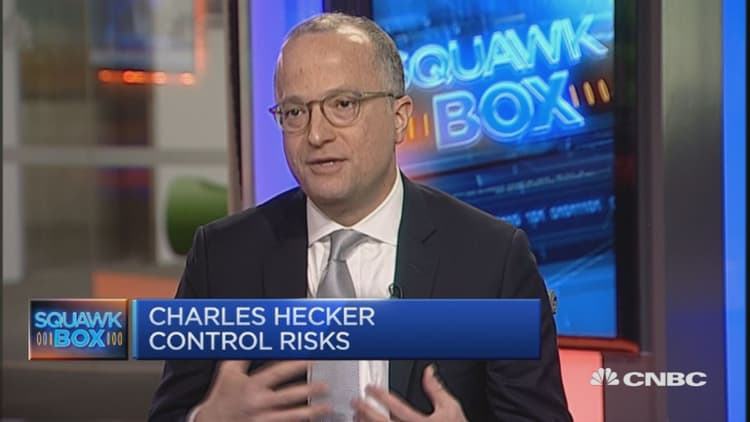The rapid click of camera shutters filled an otherwise silent room in the heart of Paris, 10 days after one of Europe's most tragic terror attacks.
French President Francois Hollande and U.K. Prime Minister David Cameron addressed the media side-by-side, with the U.K.'s Union Jack, the French Tricolor and the European Union (EU) flag hanging steps behind.
As expected, Cameron pledged to ramp up cross-border cooperation to tackle terrorism and urged for stronger external borders, collection of passenger records, intelligence sharing on the return of foreign fighters and a crackdown on the illegal arms trade.
"Now we've got to turn words into action. We simply cannot afford to wait," he said.
Less than four months later, 32 people lost their lives in coordinated strikes on Brussels' main airport and a metro just blocks from key EU buildings.
Prioritization
The continent is facing its most significant terror threat in over 10 years, according to Europol, the EU's law-enforcement agency. But some countries in Europe are at odds when it came to terror prevention.
"Issue one is prioritization," Raffaello Pantucci, director of international security studies at think tank RUSI, said, explaining that the perceived threat from terrorism starkly differed between Western Europe countries and those in the bloc's periphery.
"If you're sitting in a country like Portugal, is it (terror prevention) really top priority?...For those in eastern Europe, many are infinitely more concerned about Russia and what's happening in Ukraine, more than ISIL," he told CNBC by phone.
Another issue is the sometimes slow rate at which EU laws are approved and enacted.
For example, it's taken nearly five years for the EU Parliament to approve the collection of airline passengers' name records, due to privacy concerns. The measure, which was finally passed on April 14, allows for the gathering of seat numbers, baggage information, itinerary and ticket details in an effort to track the movements of terror suspects.
"There are very profound and serious concerns getting in the way of stronger intelligence sharing: Making sure that the information you share is confidential, remains so, and that nothing is leaked...and not endangering any operations," Florian Otto, head of Europe and Central Asia research at risk consultancy Verisk Maplecroft, told CNBC by phone.
There is also the problem of unstandardized terror laws between countries—governing how long suspects can be held and questioned, or even what constitutes a terror attack —and differing counter-terrorism capabilities.
In part, this is because some states have faced significant threats from different terrorist groups for decades, while others are new to the game, Pantucci said.
Belgium was criticized for shortcomings in its intelligence systems after speculation that both the Paris and Brussels attacks were plotted out of migrant neighborhoods like Molenbeek in the Belgian capital. This is where police shot and arrested Paris suspect Salah Abdeslam in March after a four-month manhunt.
Cooperation
Cooperation between national agencies in the U.S., Germany or the U.K. could serve as examples for the broader EU, Pantucci said.
"But I think the EU is unique in terms of the space that you're trying to cover and the differences across it," Pantucci added. "It's not first time that we're in a situation where people in a large space are trying to deal with a threat together, but I think the nature of what you're seeing at the moment is difficult.".
Perhaps one of the most tangible developments off the back of the Paris attacks was the creation of European Counter Terrorism Centre, announced in January. Supported by 39 staff and 5 seconded national experts, Europol's director Rob Wainwright said the center would serve as an information hub and help provide a "coordinated reaction in the event of major terrorist attacks," according to a media release.

However, Pantucci was pessimistic, given EU countries' track record on sharing information with organizations like Europol.
"There's already a lot in place that the EU doesn't use and that's a big problem. We should use what we have rather than creating new structures," he said.
An EU counter-terrorism memo on March 4 urged countries to share more information with authorities like Europol about foreign fighters returning from countries like Syria and Iraq. The memo said that over 90 percent of the information submitted to EU databases on foreign fighters has come from just five of the 28 EU member states.
Focus elsewhere
Growing euroskepticism in the bloc may prove a hurdle to cross-border cooperation, with some member countries increasingly dubious about the benefits of belonging to the EU and potentially unenthusiastic about requests for further data sharing.
Euroskeptic politicians in England and other countries like France are looking to claw back sovereignty from the EU and the U.K. will vote on June 23 on whether to quit the bloc.
"Brexit is not the only roadblock, but a general growing euroskepticism in all shapes and colours presents more long-term challenges," Verisk Maplecroft's Otto said.
Policymakers must also focus on other worries, including the lasting legacy of the euro zone financial crisis and the massive refugee and migrant influx in the wake of the violence in Syria and Iraq – the last of which has a bearing on how the EU tackles the ongoing terror threat.
Hope?
Terrorism is not a new phenomenon in the EU and members like Ireland, the U.K. and Spain have experience tackling domestic terror threats from groups including Basque separatists and the Irish Republican Army (IRA).
The "nihilistic nature" of the so-called Islamic State and its goal to cause mass casualties does set it apart, Pantucci explained.
"It's more of an acute problem than we've seen before, but reality is that the EU has faced terror threats in the past and will undoubtedly do so going forward," he said.
However, Otto was hopeful.
"All doom and gloom side, the EU has so far shown a certain ability to find practical solutions when they've really had to and I think there will be incremental process," he said.





